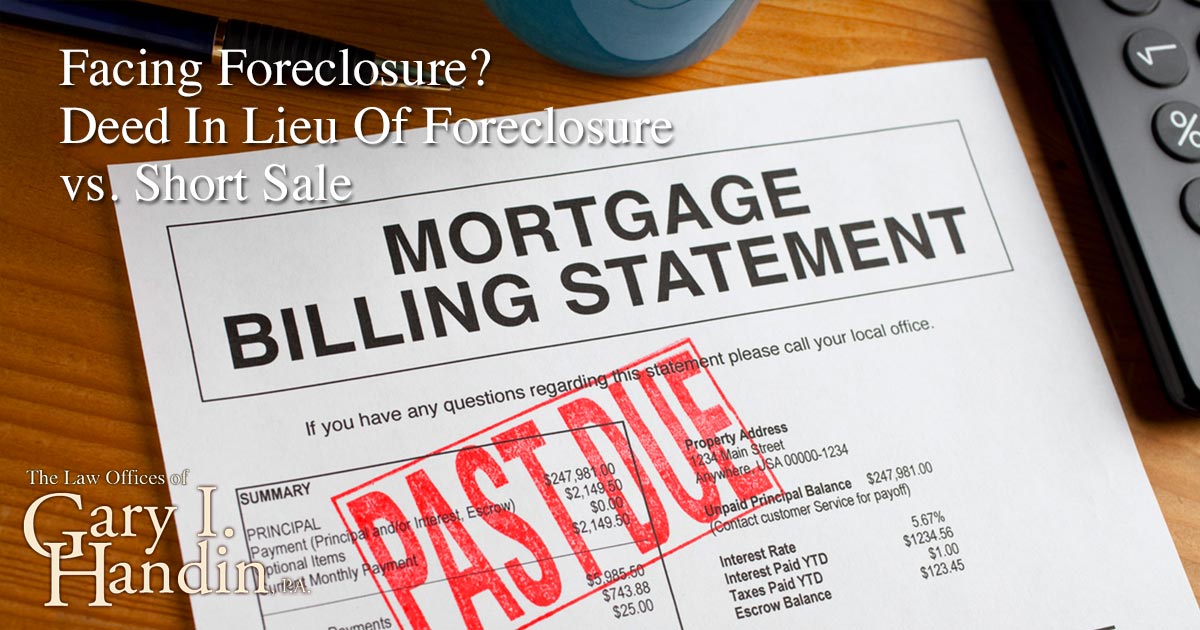
Homeowners who have defaulted on their mortgage payments may want to avoid the process and impact of foreclosure if possible. Two other options are deeds in lieu of foreclosure and short sales. Foreclosures can be lengthy and costly for both the lenders and property owners. These types of agreements can be beneficial for both parties, though they will both still have negative impacts on homeowners’ credit scores.
The following breakdown will explain each of these options so homeowners can make the best choice for their financial futures.
Overview Of Deeds In Lieu Of Foreclosure
Settling on a deed in lieu of foreclosure involves conveying the property back to the lender in exchange for the lender’s canceling the foreclosure.
Essentially the lender becomes the owner of the property after the homeowner has paid toward some of the mortgage, but for certain reasons becomes unable to continue paying. Part of some deed in lieu of foreclosure agreements involve concessions to the homeowner, like cash compensation as part of the deal or more time staying in the home than they would have with a foreclosure. The agreements may also involve a written clause that states that the homeowner is acting voluntarily.
Overview of Short Sales
Short sales occur when the lender agrees to accept the proceeds of the property sale that is less than the debt remaining on the borrowed amount.
These types of agreements will occur if the home has lost significant value in a falling market or for other reasons. Banks will sometimes require there to be an offer on the home before considering or agreeing to a short sale.
Deficiencies
What both deeds in lieu of foreclosure and short sales have in common is the possibility for deficiency judgments.
In many states, after property owners and the bank or lenders settle on either a deed in lieu of foreclosure or a short sale, the lender has the ability to file a separate suit against homeowners to recover the amount lost. It is important for homeowners to watch out for deficiency judgments in their agreements with lenders.
In some cases, homeowners may want to foreclose instead of risk a deficiency suit if their lenders do not state in the agreement that they will not pursue deficiency compensation. For homeowners to know they are off the hook of a possible deficiency, their agreement with the lender must include language saying that the transaction is in full satisfaction of the debt. However, homeowners may still face a tax liability for the forgiven debt even if the lender forgives all or part of the deficiency. The lender will report the amount forgiven to the IRS, which may treat that amount as income and tax it as such.
Multiple Mortgages
If homeowners have taken out multiple mortgages on their property, borrowers must go through the process with each lender to obtain a deed in lieu of foreclosure or a short sale agreement. It can be more difficult to secure a deed in lieu of foreclosure with multiple lenders involved.
Impacts Of Both Options
Unfortunately no matter what alternative to foreclosure that homeowners choose, their credit scores will take a hit. Property owners may still elect to pursue foreclosure alternatives if they can secure agreements in which lenders waive their ability to sue for deficiency compensation. This helps avoid the lengthy process of foreclosure, which neither the homeowners nor the lenders want to undergo. Future lenders may look more favorably on deeds in lieu or short sales in place of foreclosure.
Seeking Guidance
Whether defaulting homeowners choose to foreclose, pursue a deed in lieu of foreclosure, or secure a short sale, they may benefit from talking to a professional. Contact The Law Offices of Gary I. Handin, P.A., for advice on navigating real estate and business law.





